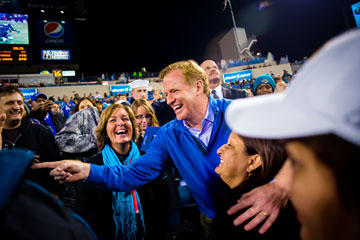
Goodell mingles with fans in Jacksonville, Fla. The Senator's son has a politician's touch
(5 of 9)
Goodell's hero is his father Charles, a New York Republican Congressman who was appointed to the Senate after RFK's assassination. He introduced the first congressional bill to end the war in Vietnam, even though he knew his party would desert him in the 1970 election. Behind his office desk, Goodell keeps the campaign trinkets people still send him--YOU'RE A GOOD MAN, CHARLIE GOODELL, says one button--and a copy of his father's Vietnam Disengagement Act hangs on the wall. "And you think I get a lot of crap?" Goodell says while showing it to me.
Backing the unpopular war was a Republican rallying point, but the elder Goodell wouldn't fall in line. "The Nixon Administration made him almost Public Enemy No. 1," says George Mitrovich, Charles Goodell's former press secretary. The kids felt it. "There was a lot of hateful invective directed at our family from time to time," says Bill Goodell, one of Roger's older brothers. As early as age 11, Roger was very aware of his father's sacrifice: he'd go with his conscience, even if it cost him his seat. "He loved being a United States Senator," says Goodell. "My personal view is, he never got over that. And that's sad to me on a lot of levels. But he did what was right. He knew the consequences. He knew it was going to end his career. You can't buy a lesson like that."
After Charles Goodell lost the 1970 election to James Buckley, who ran on the Conservative Party line--Goodell split the moderate-to-liberal vote with his Democratic opponent--the family settled in Bronxville, N.Y., a wealthy enclave just north of New York City. Roger captained the football, basketball and baseball teams his senior year of high school and was president of the Varsity Club.
He was on no one's short list for future NFL commissioner, and his brothers needled him about his poor grades. "He was a big dumb jock," says Michael. "He played that up. He was walking around in his letter jacket, with his girlfriend on his arm and stuff. He was big man on campus." Michael laughs. "And one of the things we always used to tease him about, he just used to grunt. You know, 'Hey, Rog, how are you today?' 'Grrrrr.'" Goodell says he doesn't remember the grunting, though a couple of NFL staff members say it sounds familiar. "He just wears a different jacket now," quips one. Goodell does vouch, however, for his academic ambivalence.
Even in high school, Goodell enforced a personal-conduct policy. Bronxville High School required athletes to sign a pledge: No drinking or troublemaking, or they'd be booted off the team. The other players knew Goodell would rat them out for misbehaving. "They didn't like to see me come to a party," says Goodell. "I took that pledge seriously." Michael remembers his brother's showing up at one gathering where football players were drinking. "All of a sudden it was like an alarm went off," Michael says. "They were running out the back door as he was coming in the front door. It was like Prohibition."
